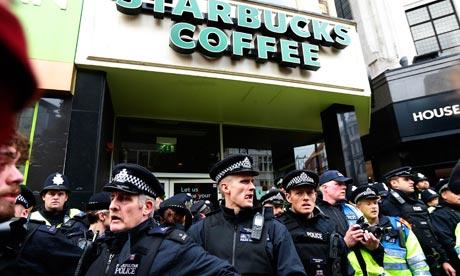
Police officers
protect a Starbucks outlet in Oxford Street during the TUC
anti-austerity protest in London on 20 October 2012. Photograph: Suzanne
Plunkett/Reuters
Those at the sharp end are being hit hardest: from cuts to disability and housing benefits, tax credits and the educational maintenance allowance and now increases in council tax while NHS waiting lists are lengthening, food banks are mushrooming across the country and charities report sharp increases in the number of children going hungry. All this to pay for the collapse in corporate investment and tax revenues triggered by the greatest crash since the 30s.
At the other end of the spectrum though, things are going swimmingly. The richest 1,000 people in Britain have seen their wealth increase by £155bn since the crisis began – more than enough to pay off the whole government deficit of £119bn at a stroke. Anyone earning over £1m a year can look forward to a £42,000 tax cut in the spring, while firms have been rewarded with a 2% cut in corporation tax to 24%.
Not that many of them pay anything like that, even now. The scale of tax avoidance by high-street brand multinationals has now become clear, in no small part thanks to campaigning groups such as UK Uncut. Asda, Google, Apple, eBay, Ikea, Starbucks, Vodafone: all pay minimal tax on massive UK revenues, mostly by diverting profits earned in Britain to their parent companies, or lower tax jurisdictions via royalty and service payments or transfer pricing.
Four US companies – Amazon, Facebook, Google and Starbucks – have paid just £30m tax on sales of £3.1bn over the last four years, according to a Guardian analysis. Apple is estimated to have avoided over £550m in tax on more than £2bn worth of sales in Britain by channelling business through Ireland, while Starbucks has paid no corporation tax in Britain for the last three years.
The Tory MP and tax lawyer Charlie Elphicke estimates 19 US-owned multinationals are paying an effective tax rate of 3% on British profits, instead of the standard rate of 26%. It's all entirely legal, of course. But taken together with the multiple individual tax scams of the elite, this roll call of corporate infamy has become an intolerable scandal, when taxes are rising and jobs, benefits and pay being cut for the majority.
Not only that, but collecting the taxes that these companies have wriggled out of would go a long way to shrinking the deficit for which working- and middle-class Britain's living standards are being sacrificed. The total tax gap between what's owed and collected has been estimated by Richard Murphy of Tax Research UK at £120bn a year: £25bn in legal tax avoidance, £70bn in fraudulent tax evasion and £25bn in late payments.
Revenue and Customs' own last guess of £35bn has been widely recognised as a serious underestimate. But even allowing for the fact that it would never be possible to close the entire gap, those figures give a sense of what resources could be mobilised with a determined crackdown. Set them, for instance, against the £83bn in cuts planned for this parliament (including £18bn in welfare) – or the £1.2bn estimated annual benefit fraud bill – and you get a sense of what's at stake.
Cameron and Osborne wring their hands at the "moral repugnance" of "aggressive avoidance", but are doing nothing serious about it whatever. They've been toying with a general "anti-abuse" principle. But it would only catch a handful of the kind of personal dodges the comedian Jimmy Carr signed up to, not the massive profit-shuffling corporate giants have been dining off.
Meanwhile, ministers are absurdly slashing the tax inspection workforce, and even introducing a new incentive for British multinationals to move their operations inbusiness to overseas tax havens. The scheme would, accountants KPMG have been advising clients, offer an "effective UK tax rate of 5.5%" from 2014 (and cut British tax revenues into the bargain).
It's not as if there aren't any number of measures that would plug the loopholes and slash tax avoidance and evasion. They include a general anti-avoidance principle (of the kind the Labour MP Michael Meacher has been pushing in a private member's bill) that would outlaw any transaction whose primary purpose was avoidance rather than economic; minimum tax (backed even by the Conservative Elphicke); and country-by-country financial reporting, and unitary taxation, to expose transfer pricing and limit profit-siphoning.
The latter would work better with international agreement. But there is already majority support in the European Union, and it is governments in countries such as Britain – where the City is itself a tax haven – that are resisting reform. When you realise how closely the tax avoidance industry is tied up with government and drawing up tax law, that's perhaps not so surprising.
But when austerity and cuts are sucking demand out of the economy, fuelling poverty and joblessness and actually widening the deficit, the need to step up the pressure for corporations and the wealthy to pay their share as part of a wider recovery strategy couldn't be more obvious.
The target has to shift from "welfare scroungers" to tax dodgers, and the campaign go national. Companies that are milking the country at the expense of the majority are especially vulnerable to brand damage. Forcing them to pay up is a matter of both social justice and economic necessity.

No comments:
Post a Comment